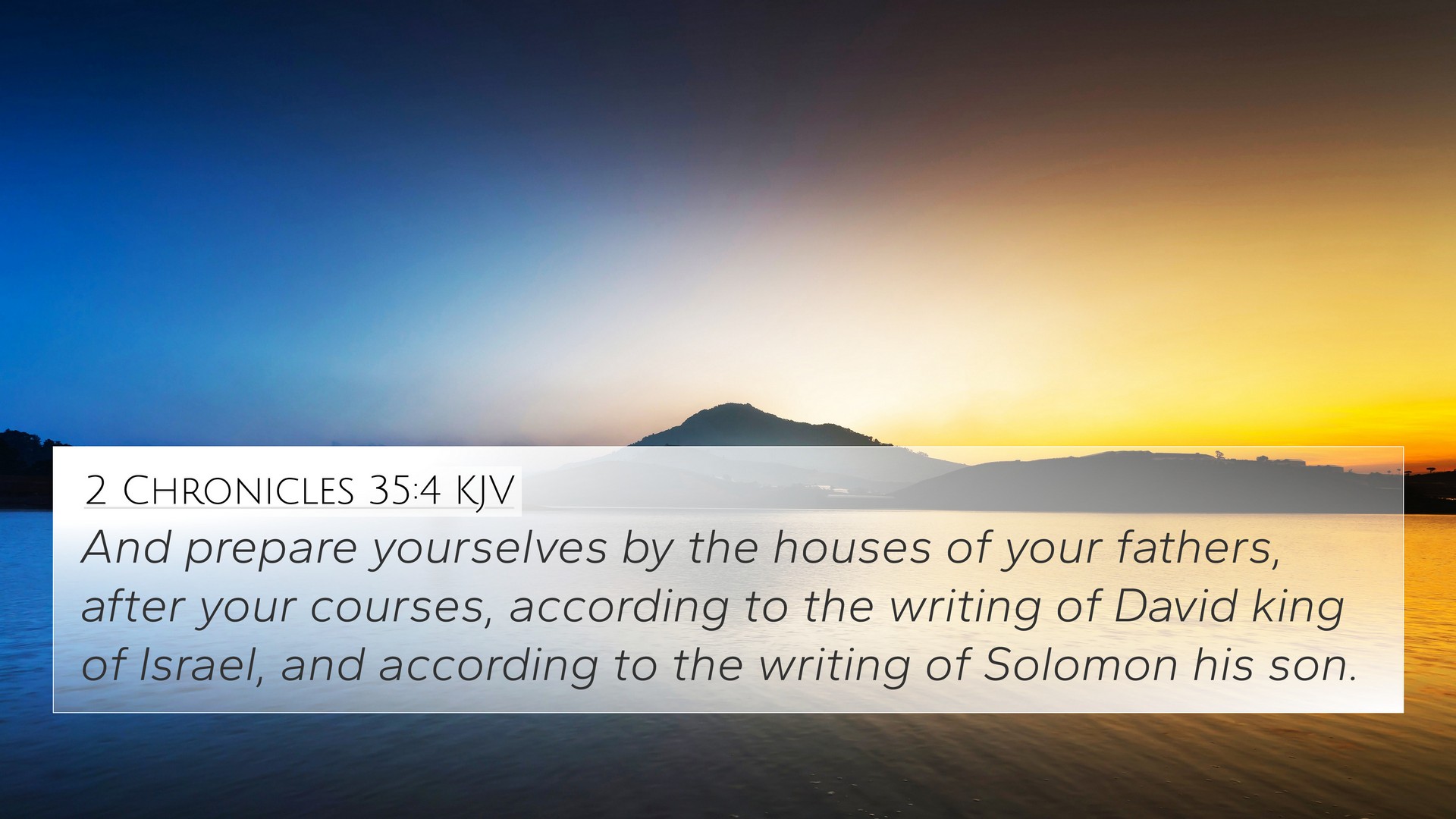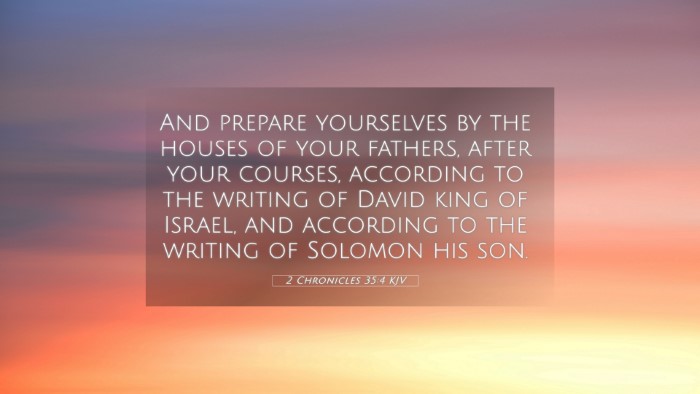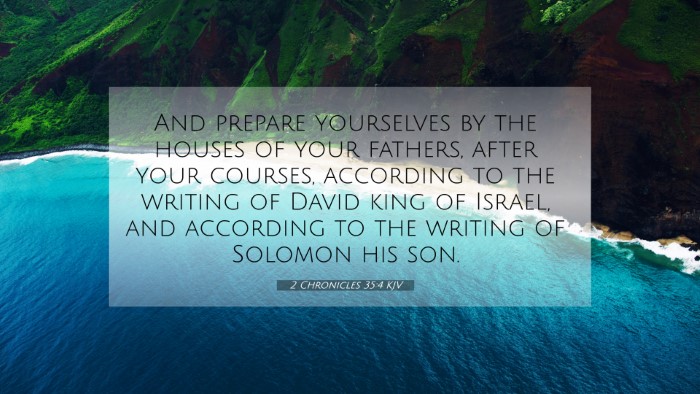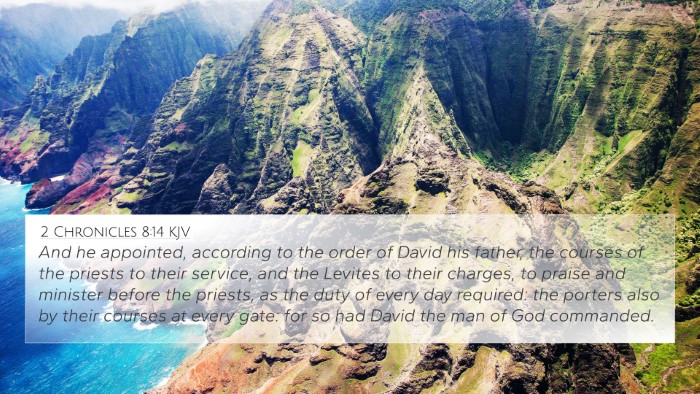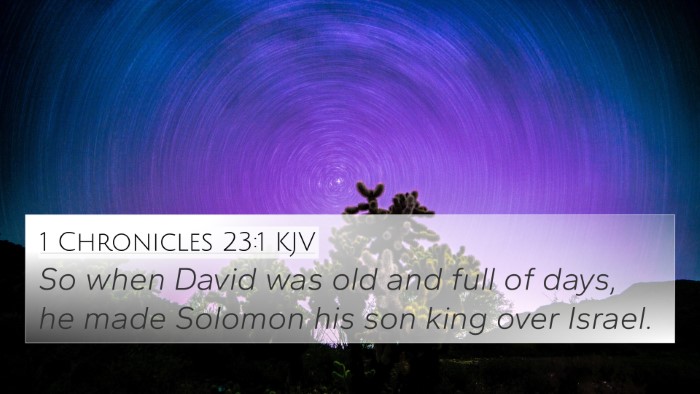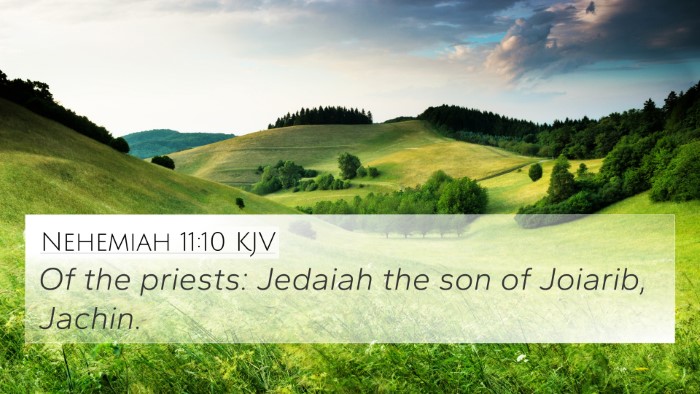Meaning and Interpretation of 2 Chronicles 35:4
Verse: "And prepare yourselves by your families, according to your divisions, as instructed by David king of Israel and the officials of his son Solomon." (2 Chronicles 35:4)
Summary of Insights from Commentaries
The account in 2 Chronicles 35:4 discusses the preparations made for the celebration of the Passover. The instructions refer back to the organization established by David and Solomon, emphasizing the importance of obedience and order in worship.
Historical Context
In the historical narrative of Israel, King Josiah reigns as a king who sought to restore the true worship of Yahweh. This verse falls within the larger context of renewed religious observance, particularly concerning the Passover, which was vital to the Jewish faith.
Importance of Preparation
Commentators highlight the significance of preparation in spiritual worship. Matthew Henry remarks that "preparation is necessary for those who would worship God acceptably." This preparation included both personal readiness and communal organization. It involves being spiritually and physically ready to partake in the sacred observances.
Divine Instruction
Albert Barnes emphasizes that the directive came from authorities and was in line with the tradition established by David and Solomon, suggesting that following divine order is key in worship practices. This ties back to the concept of scriptural cross-referencing, where understanding the precepts laid down by previous leaders is crucial for present-day observance.
Family and Community Roles
Adam Clarke notes the communal aspect of the command, highlighting that families were to come together according to their divisions. This idea reflects a collective approach to worship and the responsibilities that come with it. Here, we see thematic connections across scripture that encourage collective worship, such as in Deuteronomy 16:16-17, which mentions bringing offerings together.
Cross-References
- Exodus 12:3-6: The original institution of the Passover and the need for preparation.
- 1 Chronicles 29:22: Reference to the unity of Israel’s worship during the reign of King David.
- 2 Kings 23:21-23: A passage detailing Josiah's Passover observance.
- Deuteronomy 16:2: Instructions regarding the Passover sacrifice.
- Psalm 118:27: A psalm related to thanksgiving and worship during sacrifices.
- Matthew 26:17-19: References to preparations made for the Last Supper, paralleling Passover observance.
- Luke 22:8: Jesus instructs His disciples regarding the Passover meal, highlighting continuity in observance.
- Hebrews 10:24-25: Encouragements for communal worship and gathering.
- Romans 12:1: Call to present our bodies as living sacrifices, which connects with the theme of preparing for worship.
- 1 Peter 2:9: The concept of being a holy priesthood, reflecting on the role of the community in worship.
Thematic Connections and Interpretations
The emphasis on preparation invites an analysis of how spiritual readiness plays a role in worship across various contexts. From the instructions in the Old Testament to the practices observed in the New Testament, there is a clear thread of continuity in God's expectations of His people.
Obedience to Scripture
In reflecting on the verse, it becomes evident that obedience to God's Word is pivotal. The preparation prescribed by Josiah reflects a deeper obedience to the commandments given by God through Moses (Exodus, Deuteronomy). This theme aligns with the greater narrative of adherence to God's laws throughout scripture.
Linking Biblical Texts
Understanding the connections between this verse and others allows for a more profound appreciation of biblical themes. Each cross-reference sheds light on the significance of communal worship, the importance of family involvement, and the historic continuity of God’s covenant relationship with His people.
Conclusion
The verse serves as a reminder to all who study Scripture of the necessity of preparation in worship, the roles of community, and the profound historical context that shapes our understanding of biblical practices. By engaging with cross-referencing biblical texts and applying comparative analysis, believers can enrich their worship experiences and deepen their spiritual lives.
